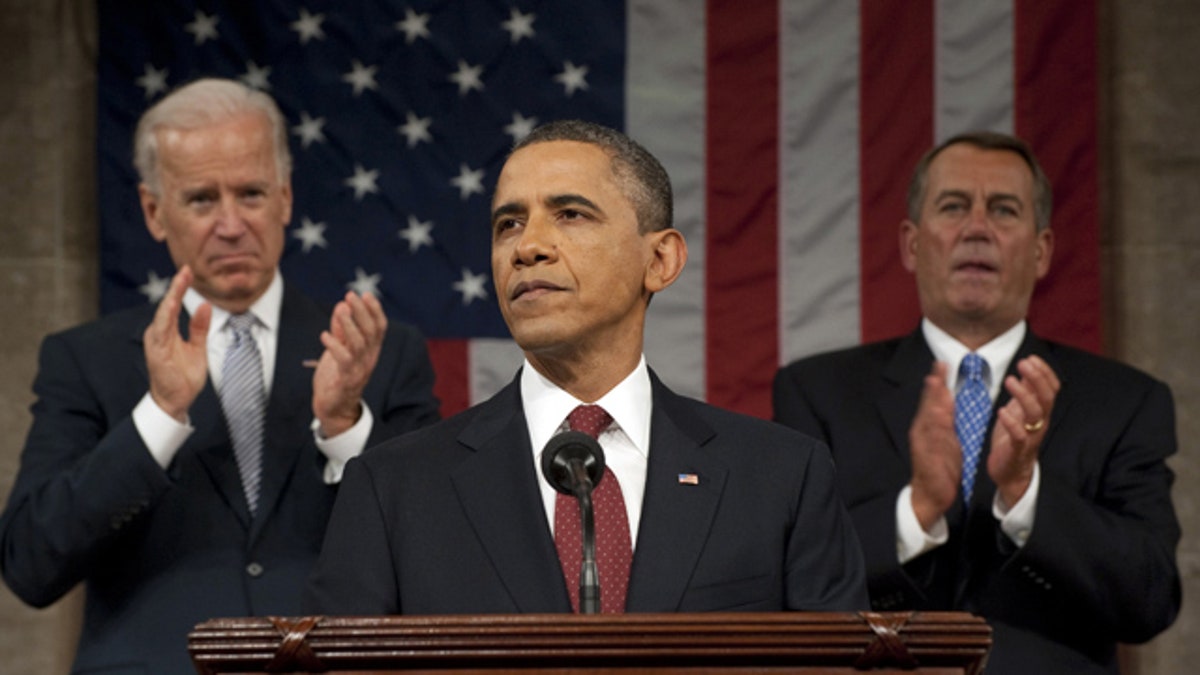
FILE -- Jan. 24, 2013: President Obama delivers his State of the Union address on Capitol Hill, as Vice President Joe Biden and House Speaker John Boehner, right, applaud. (AP)
WASHINGTON – It was a wish list, not a to-do list.
President Obama's array of plans in his State of the Union speech was light on a key piece of context -- namely, that his hands are so tied ahead of the election that it is doubtful many if any of them can be done in the remainder of his term. There can be little more than wishful thinking behind his call to end oil industry subsidies -- something he could not get through a Democratic Congress, much less today's divided Congress, much less in this election year.
A look at Obama's rhetoric Tuesday night and how it fits with the facts and political realities of the day:
OBAMA: "We have subsidized oil companies for a century. That's long enough. It's time to end the taxpayer giveaways to an industry that's rarely been more profitable, and double-down on a clean energy industry that's never been more promising."
THE FACTS: This is at least Obama's third run at stripping subsidies from the oil industry. Back when fellow Democrats formed the House and Senate majorities, he sought $36.5 billion in tax increases on oil and gas companies over the next decade, but Congress largely ignored the request. He called again to end such tax breaks in last year's State of the Union speech. And he's now doing it again, despite facing a wall of opposition from Republicans who want to spur domestic oil and gas production and oppose tax increases generally.
------
OBAMA: "Our health care law relies on a reformed private market, not a government program."
THE FACTS: That's only half true. About half of the more than 30 million uninsured Americans expected to gain coverage through the health care law will be enrolled in a government program. Medicaid, the federal-state program for low-income people, will be expanded starting in 2014 to cover childless adults living near the poverty line.
The other half will be enrolled in private health plans through new state-based insurance markets. But many of them will be receiving federal subsidies to make their premiums more affordable. And that's a government program, too.
Starting in 2014 most Americans will be required to carry health coverage, either through an employer, by buying their own plan, or through a government program.
------
OBAMA: "Tonight, I want to speak about how we move forward, and lay out a blueprint for an economy that's built to last - an economy built on American manufacturing, American energy, skills for American workers, and a renewal of American values."
THE FACTS: Economists do see manufacturing growth as a necessary component of any U.S. recovery. U.S. manufacturing output climbed 0.9 percent in December, the biggest gain since December 2010. Yet Obama's apparent vision of a nation once again propelled by manufacturing -- a vision shared by many Republicans -- may already have slipped into the past.
Over generations, the economy has become ever more driven by services; not since 1975 has the U.S. had a surplus in merchandise trade, which covers trade in goods, including manufactured and farm goods. About 90 percent of American workers are employed in the service sector, a profound shift in the nature of the workforce over many decades.
The overall trade deficit through the first 11 months of 2011 ran at an annual rate of nearly $600 billion, up almost 12 percent from the year before.
------
OBAMA: "The Taliban's momentum has been broken, and some troops in Afghanistan have begun to come home."
THE FACTS: Obama is more sanguine about progress in Afghanistan than his own intelligence apparatus. The latest National Intelligence Estimate on Afghanistan warns that the Taliban will grow stronger, using fledgling talks with the U.S. to gain credibility and stall until U.S. troops leave, while continuing to fight for more territory. The classified assessment, described to The Associated Press by officials who have seen it, says the Afghan government hasn't been able to establish credibility with its people, and predicts the Taliban and warlords will largely control the countryside.
------
OBAMA: "On the day I took office, our auto industry was on the verge of collapse. Some even said we should let it die. With a million jobs at stake, I refused to let that happen. In exchange for help, we demanded responsibility. We got workers and automakers to settle their differences. We got the industry to retool and restructure. Today, General Motors is back on top as the world's number one automaker. Chrysler has grown faster in the U.S. than any major car company. Ford is investing billions in U.S. plants and factories. And together, the entire industry added nearly 160,000 jobs."
THE FACTS: He left out some key details. The bailout of General Motors and Chrysler began under Republican President George W. Bush. Obama picked up the ball, earmarked more money, and finished the job. But Ford, which Obama mentions as well, never asked for a federal bailout and never got one. It's managed to get along on its own. Also, as part of its restructuring, Chrysler is not really a U.S. automaker anymore. Italian automaker Fiat now owns a 30 percent share, and it will eventually go to 51 percent under terms of the U.S. bailout and its bankruptcy restructuring.




